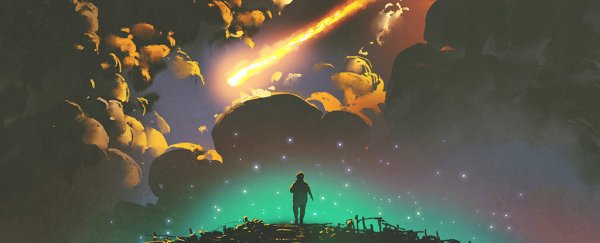The Universe is so unimaginably big, and it's positively teeming with an almost infinite supply of potentially life-giving worlds. So where the heck is everybody?
At its heart, this is what's called the Fermi Paradox: the perplexing scientific anomaly that despite there being billions of stars in our Milky Way galaxy – let alone outside it – we've never encountered any signs of an advanced alien civilisation, and why not?
It's a decent question, and one that generations of scientists and thinkers have grappled with since the paradox was formulated decades ago.
Some suggest aliens might be hibernating, or that something mysterious is preventing their evolution from taking place. Or maybe they just don't want anything to do with us?
Now, theoretical physicist Alexander Berezin from the National Research University of Electronic Technology (MIET) in Russia has devised his own explanation for why we're seemingly alone in the Universe, proposing what he calls his "First in, last out" solution to the Fermi Paradox.
According to Berezin's pre-print paper, which hasn't as yet been reviewed by other scientists, the paradox has a "trivial solution, requiring no controversial assumptions" but may prove "hard to accept, as it predicts a future for our own civilisation that is even worse than extinction".
As Berezin sees it, the problem with some proposed solutions to the Fermi Paradox is they define alien life too narrowly.
"The specific nature of civilisations arising to interstellar level should not matter," he writes.
"They might [be] biological organisms like ourselves, rogue AIs that rebelled against their creators, or distributed planet-scale minds like those described by Stanislaw Lem in Solaris."
Of course, even with such a wide scope, we're still not seeing evidence of these things out there in the cosmos.
But for the purposes of solving the paradox, Berezin says the only parameter we should concern ourselves with – in terms of defining extraterrestrial life – is the physical threshold at which we can observe its existence.
"The only variable we can objectively measure is the probability of life becoming detectable from outer space within a certain range from Earth," Berezin explains.
"For simplicity let us call it 'parameter A'."
If an alien civilisation doesn't somehow reach parameter A – whether by developing interstellar travel, broadcasting communications across space, or by other means – it might still exist, but not help us solve the paradox.
The actual "First in, last out" solution Berezin proposes is a grimmer scenario.
"What if the first life that reaches interstellar travel capability necessarily eradicates all competition to fuel its own expansion?" he hypothesises.
As Berezin explains, this doesn't necessarily mean a highly developed extra-terrestrial civilisation would consciously wipe out other lifeforms – but perhaps "they simply won't notice, the same way a construction crew demolishes an anthill to build real estate because they lack incentive to protect it".
So is Berezin suggesting that we are the ants, and the reason we haven't encountered aliens is because we simply haven't had our own civilisation unthinkingly demolished by such unimaginably superior life forms yet?
No. Because we are probably not the ants, but the future destroyers of the very worlds we've been looking for this whole time.
"Assuming the hypothesis above is correct, what does it mean for our future?" Berezin writes.
"The only explanation is the invocation of the anthropic principle. We are the first to arrive at the [interstellar] stage. And, most likely, will be the last to leave."
Again, such potential destruction wouldn't need to be wilfully designed or orchestrated – it could just play out like a completely unrestricted system, bigger than any individual's attempts to control it.
One example Berezin gives is free market capitalism, and another could be the dangers of an artificial intelligence (AI) untethered by constraints on its accumulation of power.
"One rogue AI can potentially populate the entire supercluster with copies of itself, turning every solar system into a supercomputer, and there is no use asking why it would do that," Berezin writes.
"All that matters is that it can."
It's a pretty terrifying outlook on Fermi – basically, we may be the winners of a deadly race we didn't even know we were competing in, or as Andrew Masterson at Cosmos put it, "we are the paradox resolution made manifest".
Even Berezin admits he hopes he is wrong about this, and it's worth noting that many other scientists have much more optimistic views about when we can expect to hear from advanced alien life.
But the physicist's views are just the latest scientific statement of why we may be destined to gaze at the stars alone in time and space, much as we might wish it were otherwise.
The paper is available at arXiv.org.
